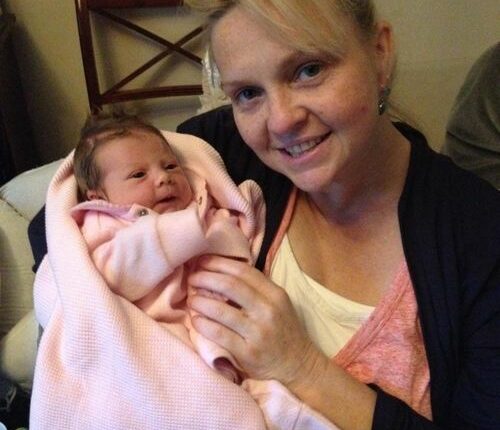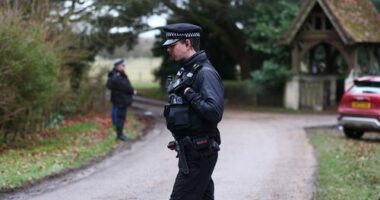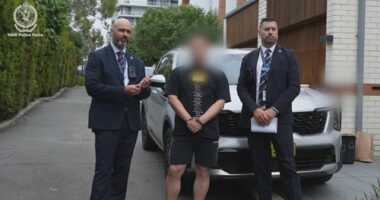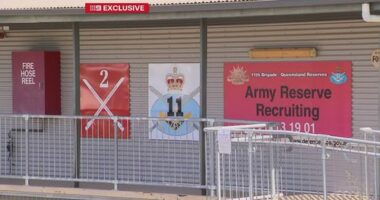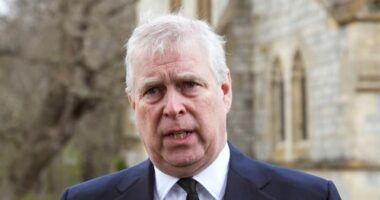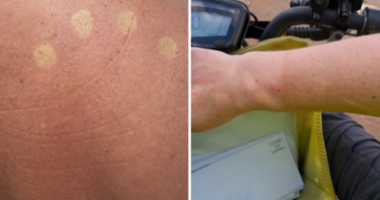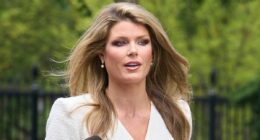Share this @internewscast.com
The journey to motherhood is a blend of joy and anxiety, often marked by numerous surprises along the way.
Two Australian mothers, Liz Walton and Julie Sweet, are breaking the mold by embracing motherhood for the first time in their late 40s, a time when many of their peers are entering menopause.

Neither Walton nor Sweet anticipated becoming mothers at this stage in life, but they shared with nine.com.au how their additional years of life experience have enriched their parenting skills.
Liz Walton, a 55-year-old fertility coach from Canberra, embarked on her path to parenthood a decade before finally conceiving, following the meeting with her partner.
“Being somewhat older already, we decided to start trying for a baby as soon as possible,” Walton explained.
“Already being a little older, it was like ‘We’re gonna start trying to have a baby as soon as we can’,” Walton said.
“Basically, a lot of our trying was in vain.
“And that’s when we started to realise there must be an issue.”
The couple went through six traumatic rounds of IVF without any success.
Walton said she “gave up” on her dream of motherhood at around age 43.
”At that age, they say your egg quality goes down and then also your chances to get pregnant really plummet,” she recalled.
“Then I sort of spent a good 18 months working on myself to find happiness and peace.”
Two years later, Walton fell pregnant naturally at the age of 45.
She admitted it was difficult to feel elated at first.

“I remember going back home and dropping to my knees thinking… how do I deal with this?” Walton said.
Pregnancy and childbirth a few years shy of 50 had its setbacks.
Walton said she feared losing her unborn child and knew there would be some difficult times that lay ahead.
“Having a baby at 46… I understand why it is a younger person’s game, because it’s quite traumatic to the body giving birth,” she explained.
“I wasn’t allowed to do a home birth because of my age.”
The medical anxiety was coupled with thoughts which made her question herself.
“Is this right? Am I being fair?” Walton said.
“Part of me was thinking, ‘Oh, my goodness, when she’s 10, I’ll be 56. What will that be like?’”
Now at 55 with a nine-year-old daughter, Walton knows exactly what it is like.
And she said her age has only enriched her parenting.
“I became a happier, balanced, emotionally stable human being,” Walton said.
“And that’s why I say, when the student is ready, the teacher arrives.”

Sweet was nearly 48 when she welcomed her son after falling pregnant on her ninth round of IVF.
“It was surreal, overwhelming, and honestly quite shocking,” she recalled.
The Bondi clinical psychotherapist told nine.com.au she endured some medical professionals who “lacked compassion” along the way.
But she described later motherhood as a gift.
“I’ve lived a life. I feel ready. I’m my most grounded, fulfilled, nourished, and happiest self (even if I’m turning 51 next year),” Sweet said.
“I never experienced this in my 20s or 30s.
“Only with age â and the perspective that comes with lived experience, have I gained clarity about what truly matters, where my energy needs to go, and who deserves it.
“I trust myself more. My inner world feels more stable. My gratitude is deeper.”
Sweet said she believes there is a cultural shift away from the nuclear version of motherhood.
Through her work, she is seeing more women choose to delay having children to their late 30s and 40s.
“Women are realising that traditional expectations â about age, career, and family – don’t need to dictate their choices,” Sweet added.
“From a therapeutic perspective, this shift is meaningful for mental health. Choosing to become a parent later often brings greater self-awareness, emotional resilience, and clarity of values, which can positively influence parenting and family dynamics.
“Of course, older parents may face unique anxieties â around energy, health, or longevity, yet these are often balanced by a profound sense of readiness and life experience.”
